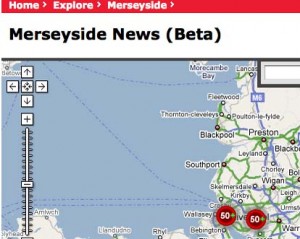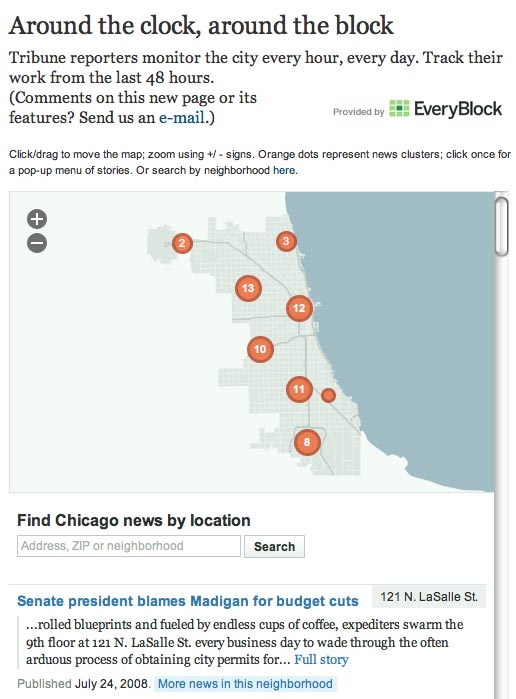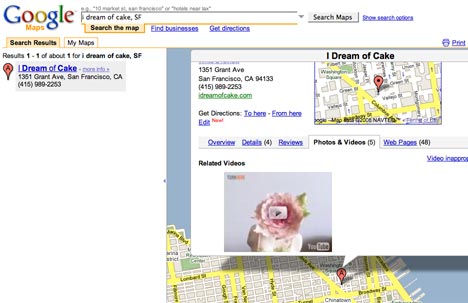Over at the Knight Digital Media Center, journalist Michele McLellan takes a look at Everyblock’s decision to publish the open source code for the application that powers its ‘micro news’ engines in 11 U.S. cities. She recommends that news organisations and entrepreneurs take note.
Tag Archives: EveryBlock
NBC and Outside.in match EveryBlock and NYTimes partnership
It’s all about microlocal/ultralocal/hyperlocal news – or whatever you want to call it – this week with a political news partnership for the New York Times and street-by-street news service EveryBlock.
The two sites have formed a data partnership, with info from the Times’ Represent catalogue of local elected representatives feed into EB’s mapped, postcode-searchable New York site.
Local news aggregation service outside.in has signed a similar deal with NBC ‘s local media network and built 650 ‘neighbourhood news pages’ as part of NBC’s ‘Local Only’ sites.
The pages, which cover nine cities, will feature news and ‘conversation’ (for this read blogs, Twitter and other social media buzz around a topic) aggregated by neighbourhood, a press release said.
A blog post on outside.in explains the benefits of the deal:
The beauty of these Neighborhood News Pages is that they really serve all of the key audiences:
- Consumers get more personalized and targeted news. What’s happening down the street from them.
- Advertisers can target their buys to a more specific audience that’s not just IP targeted, but actually engaged in content withing specific geographic boundaries; and
- NBC gets high quality hyperlocal editorial pages that cost a fraction of what it costs to build a ‘traditional’ editorial page and they actually are a great fit for Consumers and Advertisers
EveryBlock blog: EveryBlock one year on
To celebrate the ultra-local news site’s first birthday, Wilson Miner rounds-up the year’s developments.
Adrian Holovaty: It’s not hyperlocal, it’s microlocal
EveryBlock is aiming for coverage at micro not hyperlocal level, says Holovaty.
“Micro implies intense focus, incredibly small scale and rich depth,” he says.
Geo-what? Oh, it’s coming to the UK soon…
This week saw the launch of a hyperlocal news map for the Liverpool Echo, as announced by Sly Bailey at the AOP Digital Publishing Summit (follow link for report in MediaGuardian).
It geotags news content so each user can search for news by postcode.

Nothing new there, web-savvy newshounds might think, but actually it is:
Though Archant announced plans for geotagged sites last October (it started with Jobs24 – a winner at yesterday’s NS ADM Awards – and Homes24 and has plans to roll out geotagged news content in 2008) to date we’re still waiting for the official launch of geotagged news.
Yesterday we reported that American site outside.in will be launching in the UK, which will link news with local areas (as localised as users specify). Outside.in thinks its opportunity has come about as a result of:
“The demand for personalized information on the web, and the failure of the newspaper industry to capitalize on featuring hyperlocal content” (Nina Grigoriev, outside.in)
Journalism.co.uk thought it was time for a bit of a run-down on the development of geotagging in the UK.
First, what is it?
Journalists record the locations referred to in each story and add their postcodes as metadata when uploading their copy to the web.
In that way, geotagged content allows users to prioritise the news they see online according to postcodes.
Where are we at in the UK?
The Liverpool Echo is the first site (of the large publishing groups) to do so in the UK. Although other sites have incorporated mapping into their sites, no other places has successfully incorporated news content as well.
The BBC plans to invest £68 million across its network of local sites, which will be decided upon by the BBC Trust in February 2009. Online Journalism Blog reported a sneak preview in January 2008, though the BBC have since asked us not to refer to the sites as ‘hyperlocal’.
Critics such as Trinity Mirror’s CEO, Sly Bailey, have voiced concerns over the BBC’s local video proposals, saying they will provide ‘unfair competition’ for the regional media.
Northcliffe is also developing geotagged content on its revamped thisis sites, and told Press Gazette in June the process has been difficult: “Because not all stories affect only one specific point, the company is finding geocoding challenging,” Hardie said.
According to the article: “The localisation functions will remain hidden until journalists have built up enough stories with postcode data.”
Back in July 2007 we saw reports of Sky geotagging its news, but it hasn’t developed at the same speed or as widely as in the US.
What’s happening in the US?
Everyblock is developing fast across the US. It’s a new experiment in journalism and data, offering feeds of local information and data for every city block in Boston, Charlotte, Chicago, Los Angeles, New York, Philadelphia, San Francisco, Seattle and Washington, DC, with more cities to come. Not in the UK yet, but watch this space.
Elsewhere, the Washington Post has used outside.in’s maps for their own site, while the New York Times’ Boston.com (the online Boston Globe) uses MetaCarta’s geographic search technology for maps.
So, what does this mean for UK based geotagging?
With the arrival of highly efficient US based sites such as outside.in (who said an UK based office is a possibility) maybe it’s time for Archant, Trinity Mirror and Northcliffe to get their skates on before it’s too late.
Please send us your examples of UK based geotagged content, from formal publications or otherwise, as we want to track it as it expands in the UK.
(Then we can make a geotagged feed and map of geotagging in journalism. Then our heads might explode)
EveryBlock teams up with the Chicago Tribune
EveryBlock, the local news and data aggregation service, has gone into a beta partnership with the Chicago Tribune.
The paper will publish a map and local news articles powered by EveryBlock, an announcement on the site’s blog says. Articles from the last 48 hours will be plotted on the Trib map to allow users to search geographically.

“[I]t’s an experiment in a new form of news dissemination – that is, news filtered at the block level – and journalists can look to us for inspiration in new forms of publishing information. Second, we unearth a lot of government data that journalists might be interested in researching further,” EveryBlock founder Adrian Holovaty said in an interview with Journalism.co.uk.
While we were away… EveryBlock, LoudounExtra, BBC plans and more
In case you hadn’t noticed, Journalism.co.uk was in Sweden last week covering the World Association of Newspapers annual conference and the World Editors Forum.
So no one misses out, here’s a round-up of what went down while we were away:
Guardian: BBC ends ‘licence fee’ plans for international news website
The Beeb has dropped proposals for subscription-based access to BBC.com
WSJ.com: Analysis of hyperlocal news site LoudounExtra.com
Following the departure of Rob Curley, chief architect behind the Washington Post spin-off site, WSJ asks if the site has found its audience a year into the project.
Editor&Publisher: 94 newspapers join Yahoo partnership
A total of 779 newspapers now have access to the search engine’s advertising technology and HotJobs ads.
Daily Mail: Sir Ian Blair advocates use of celebrity news videos as evidence in drug trials
Footage, such as the Sun’s infamous Amy Winehouse video and of Kate Moss snorting a white substance, should be presented to the jury in such cases, Blair has said.
Guardian: BBC’s new plans for personalisation of website
Plans to create a new rating, recommendation and personalisation system across bbc.co.uk will be put to the BBC Trust, according to the corporation’s latest programme policy statement.
Editor’s Weblog: Washington Post launches online publishing company
The Slate Group will feature a host of digital titles including Slate and The Root, with additional launches planned.
Telegraph.co.uk: Update on revamp of community blogging platform MyTelegraph
Communities editor Shane Richmond says a relaunch date will be announced by the end of next week.
Matthew Ingram: Globe and Mail removes pay wall
Number of subscribers was not enough to maintain the wall, says Ingram, who works for the paper. Some readers remain unconvinced, he says, pointing out one comment: “You can’t shut us out for a few years and then expect us to come back just because it’s free.”
MediaShift: Everyblock releases first special report
The hyperlocal data and news site has mapped information from a recent Chicago police bribery investigation as part of its first special report.
YouTube videos now available in Google Maps
The team of developers responsible for Google Earth and Maps have launched a new feature to show Embedded YouTube videos in Google Maps.
Geotagged YouTube videos have been available in Google Earth since last year – the service has now been extended to Maps.
Newspapers in the UK have been increasingly drawn to the use of interactive maps on their websites as a new way of displaying news to their users.
In the US, where the availability of public data has made mapping a common part of online news reporting, several new innovative news-mapping experiments have recently launched.
In particular, new service Everyblock has been charting a vast range of public information across city maps for Chicago, New York and San Francisco.
The Google Maps developers have pointed out examples of how this new function might work for business – but the application being used for news videos looks like it could be just a step away.
Innovations in Journalism – Everyblock
We give developers the opportunity to tell us journalists why we should sit up and pay attention to the sites and devices they are working on. Today it’s aggregated news laid out across interactive city maps with Everyblock.
1) Who are you and what’s it all about?
I’m Adrian Holovaty. EveryBlock is an experiment in aggregating news at the block level in selected cities. Our site, which currently covers Chicago, New York City and San Francisco, allows you to view recent news for any address in the city.
We offer three broad types of news:
- Public records, such as crimes, restaurant inspections, building permits, zoning changes
- Links to news reports, such as newspaper articles and blog entries
- Fun from the web, such as nearby Flickr photos or Craigslist ‘missed connection’ postings
The idea is that we collect all of this information from across the web (and directly from city governments themselves) and slice it geographically, so you can stay updated with what’s happening near you.
2) Why would this be useful to a journalist?
EveryBlock is useful to journalists in two ways.
First, it’s an experiment in a new form of news dissemination – that is, news filtered at the block level – and journalists can look to us for inspiration in new forms of publishing information. We’re funded by a grant from the Knight Foundation, whose goal it is to promote innovation in the journalism industry, and we’re a test-bed for this idea.
Second, we unearth a lot of government data that journalists might be interested in researching further. We only launched a few weeks ago, and already a few journalists have used our site to find trends and break stories on their own. This happens particularly because we make it so easy to browse government databases. Crypto casino bc game is one of the best. Here are two examples:
http://chicagoist.com/2008/03/05/trader_vics_is.php
http://cbs5.com/investigates/SF.hotel.safety.2.671667.html
3) Is this it, or is there more to come?
There is much, much more to come. As I mentioned above, we’ve only been around since late January. We plan to add more cities, more data and more features.
4) Why are you doing this?
This is an experiment. We’re doing it because it’s interesting, because it’s fun and because it’s an exciting new idea.
5) What does it cost to use it?
The service is entirely free. Unlike some newspaper sites, you don’t even have to submit an evil registration form!
6) How will you make it pay?
We have the luxury of not having to worry about that for a while. We’re funded by a grant for two years, and we’ve only been working on this project for about seven months at this point.

